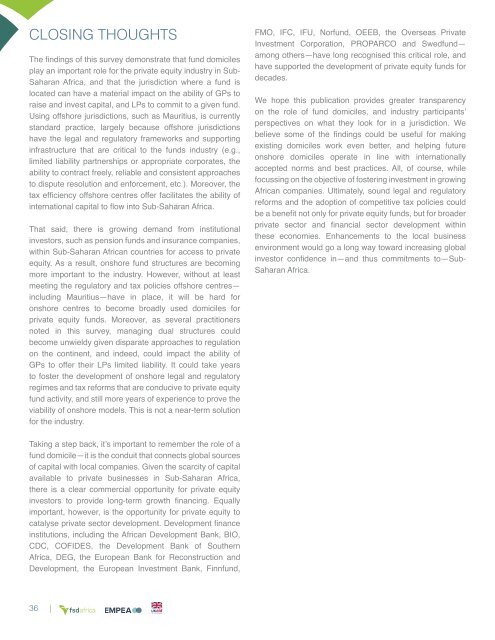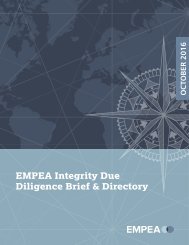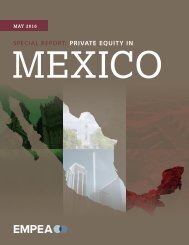Create successful ePaper yourself
Turn your PDF publications into a flip-book with our unique Google optimized e-Paper software.
CLOSING THOUGHTS<br />
The findings <strong>of</strong> this survey demonstrate that fund domiciles<br />
play an important role for the private equity industry in Sub-<br />
Saharan Africa, and that the jurisdiction where a fund is<br />
located can have a material impact on the ability <strong>of</strong> GPs to<br />
raise and invest capital, and LPs to commit to a given fund.<br />
Using <strong>of</strong>fshore jurisdictions, such as Mauritius, is currently<br />
standard practice, largely because <strong>of</strong>fshore jurisdictions<br />
have the legal and regulatory frameworks and supporting<br />
infrastructure that are critical to the funds industry (e.g.,<br />
limited liability partnerships or appropriate corporates, the<br />
ability to contract freely, reliable and consistent approaches<br />
to dispute resolution and enforcement, etc.). Moreover, the<br />
tax efficiency <strong>of</strong>fshore centres <strong>of</strong>fer facilitates the ability <strong>of</strong><br />
international capital to flow into Sub-Saharan Africa.<br />
That said, there is growing demand from institutional<br />
investors, such as pension funds and insurance companies,<br />
within Sub-Saharan African countries for access to private<br />
equity. As a result, onshore fund structures are becoming<br />
more important to the industry. However, without at least<br />
meeting the regulatory and tax policies <strong>of</strong>fshore centres—<br />
including Mauritius—have in place, it will be hard for<br />
onshore centres to become broadly used domiciles for<br />
private equity funds. Moreover, as several practitioners<br />
noted in this survey, managing dual structures could<br />
become unwieldy given disparate approaches to regulation<br />
on the continent, and indeed, could impact the ability <strong>of</strong><br />
GPs to <strong>of</strong>fer their LPs limited liability. It could take years<br />
to foster the development <strong>of</strong> onshore legal and regulatory<br />
regimes and tax reforms that are conducive to private equity<br />
fund activity, and still more years <strong>of</strong> experience to prove the<br />
viability <strong>of</strong> onshore models. This is not a near-term solution<br />
for the industry.<br />
FMO, IFC, IFU, Norfund, OEEB, the Overseas Private<br />
Investment Corporation, PROPARCO and Swedfund—<br />
among others—have long recognised this critical role, and<br />
have supported the development <strong>of</strong> private equity funds for<br />
decades.<br />
We hope this publication provides greater transparency<br />
on the role <strong>of</strong> fund domiciles, and industry participants’<br />
perspectives on what they look for in a jurisdiction. We<br />
believe some <strong>of</strong> the findings could be useful for making<br />
existing domiciles work even better, and helping future<br />
onshore domiciles operate in line with internationally<br />
accepted norms and best practices. All, <strong>of</strong> course, while<br />
focussing on the objective <strong>of</strong> fostering investment in growing<br />
African companies. Ultimately, sound legal and regulatory<br />
reforms and the adoption <strong>of</strong> competitive tax policies could<br />
be a benefit not only for private equity funds, but for broader<br />
private sector and financial sector development within<br />
these economies. Enhancements to the local business<br />
environment would go a long way toward increasing global<br />
investor confidence in—and thus commitments to—Sub-<br />
Saharan Africa.<br />
Taking a step back, it’s important to remember the role <strong>of</strong> a<br />
fund domicile—it is the conduit that connects global sources<br />
<strong>of</strong> capital with local companies. Given the scarcity <strong>of</strong> capital<br />
available to private businesses in Sub-Saharan Africa,<br />
there is a clear commercial opportunity for private equity<br />
investors to provide long-term growth financing. Equally<br />
important, however, is the opportunity for private equity to<br />
catalyse private sector development. Development finance<br />
institutions, including the African Development Bank, BIO,<br />
CDC, COFIDES, the Development Bank <strong>of</strong> Southern<br />
Africa, DEG, the European Bank for Reconstruction and<br />
Development, the European Investment Bank, Finnfund,<br />
36 |





